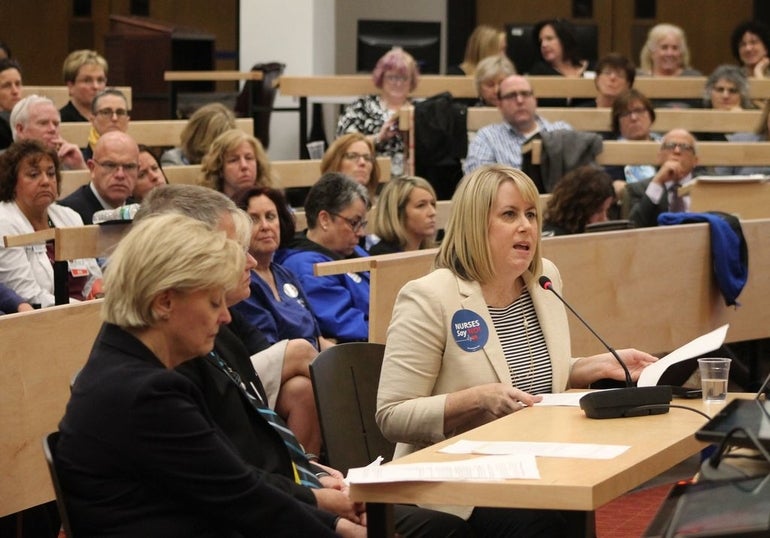Nurses who support mandatory staffing ratios are keeping their powder dry for a ballot fight they expect to wage this fall, a union chief told lawmakers on Monday.
The Gardner Auditorium, where the Public Health Committee held a hearing on two similar ballot proposals, was not filled with a sea of blue scrubs Monday because nurses – who would need to take time off to visit Beacon Hill – have decided to make their appeals directly to voters, Massachusetts Nurses Association President Donna Kelly Williams said.
“This year they are saving those paid days to knock on doors, to phone bank and to register voters ahead of November when this issue will be on the ballot,” Kelly Williams told the lawmakers. Other union officials confirmed the MNA is not interested in finding a compromise to its proposal to limit the number of patients assigned to one nurse. The levels would vary depending on the type of care being administered.
The ballot has been the preferred route for relaxing the state’s marijuana laws – culminating in legalized retail sales in 2016 – and the nurses union threatened to go to the ballot in 2014 with a similar nurse staffing question before agreeing to a compromise that mandates certain staffing levels in intensive care units.
“Nurses are spread too thin with too many patients,” said Angela Ortiz, a mother who said her young daughter has been hospitalized more than a dozen times.
Other nurses and nurse managers who appeared before lawmakers on Monday said they disagree with the approach taken by the MNA, arguing “rigid” rules would hamper clinicians’ ability to treat patients and could draw nurses out of community settings and into major hospitals.
“Simply having less patients doesn’t make me a better nurse,” said Meghan Aldrich, a nurse at Sturdy Memorial Hospital in Attleboro. She said, “These ratios would override our professional judgment.”
The nurses union proposed two questions, both of which would mandate staffing levels for certain nursing responsibilities. One of the questions would also require hospitals to issue new financial disclosures. The attorney general declined to certify the more expansive ballot proposal, determining that it contained two unrelated policy proposals. The nurses have appealed that ruling to the Supreme Judicial Court and are awaiting a decision.
Both sides in the looming ballot fight publicized reports on Monday to bolster their case.
A report commissioned by the Massachusetts Health and Hospital Association found that the change in policy would cost the health care system $1.3 billion the first year and $900 million annually in subsequent years while adding an additional $100 million in state obligations. The report by Mass Insight Global Partnerships and BW Research Partnership found that implementation would require the hiring of 5,911 registered nurses within 37 business days.
Meanwhile a survey commissioned by the MNA conducted by Anderson Robbins Research found that 77 percent of nurses reported they are assigned “too many patients to care for at one time” and 86 percent of the nurses surveyed support changing the law to mandate “safe patient limits.”
Sen. Jason Lewis, a Winchester Democrat and co-chairman of the Public Health Committee, told the News Service he is “willing to work with both sides” – legislators presented with ballot questions are required to vet the proposals and see whether they can come up with compromises.
Asked whether she had invited both sides to the negotiating table, Rep. Kate Hogan, a Stow Democrat and the committee’s co-chairwoman, said, “That wasn’t necessarily in any of the work that we were doing.”
Rep. Marjorie Decker, a Cambridge Democrat, said she hopes lawmakers avoid a ballot question by passing into law the mandates requested by nurses.
Petitioners eager to go to the ballot may begin collecting a second and final round of signatures this week.
Amanda Oberlies, the CEO of the Organization of Nurse Leaders, predicted that hospitals would be unable to staff up if the proposal becomes law, and facilities would need to close beds.
“This ballot question promotes numbers-centered care,” Oberlies said.
Rep. Denise Garlick, a registered nurse and Needham Democrat who worked on the 2014 compromise, said she “unequivocally” supports the MNA’s efforts.
Nurses for years have pushed staffing requirement legislation on Beacon Hill, but their proposals have failed to gain traction in the Legislature.

